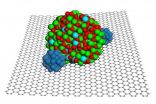(Press-News.org) Lung injury is a common cause of death among patients with pneumonia, sepsis or trauma and in those who have had lung transplants. The damage often occurs suddenly and can cause life-threatening breathing problems and rapid lung failure.
There are no effective treatments. Patients usually are put on ventilators to give their lungs a chance to heal, but there is little else doctors can do but wait and hope for the best.
Now, researchers at Washington University School of Medicine in St. Louis report they have identified a gene that limits damage to the lung during acute stress from illness, trauma or transplant. Defects in the bcl3 gene likely leave some patients more vulnerable to lung injury, they say.
The scientists also have demonstrated that this critical gene, which is active in bone marrow cells, can prevent lung injury in mice. The research is published in the Journal of Clinical Investigation.
The new discovery lays the groundwork for developing therapies to reduce complications of pneumonia, trauma and lung transplants, which affect many thousands of people annually in the United States.
"Acute lung injury is a very serious problem," says senior author Andrew Gelman, PhD, assistant professor of surgery and of pathology and immunology. "Patients' lungs fill with fluid, they can't breathe, and sadly there are no drugs available to reverse the condition."
The real culprits underlying acute lung injury are infection-fighting white blood cells called neutrophils. When the body makes too many neutrophils, however, they begin to attack healthy tissue, causing even more damage and sometimes even death.
"In mice, we found that the bcl3 gene essentially controls how many neutrophils the body produces under acute stress in the lung," Gelman says.
The same gene exists in people. Mutations in bcl3 have long been associated with the development of leukemia and lymphoma. Only recently has it been found to play a role in inflammation.
The research team stumbled onto bcl3 as part of an effort to determine why a newly transplanted lung often becomes injured in the hours after surgery. The damage occurs as the blood begins to flow through the organ again and increases the risk of rejection. In earlier studies, they had found that soon after a lung transplant, the new lung signals to the bone marrow to produce massive amounts of neutrophils.
"We wanted to understand how the lung is talking to the bone marrow and what is driving this extraordinary increase in neutrophils," Gelman says. "The lung tends to be unique in this manner; we don't see this with other organ transplants, such as the heart."
In a series of experiments in mice undergoing lung transplants, the researchers found that in response to acute stress in the lung, a cytokine called granulocyte colony stimulating factor (G-CSF) accumulates in the blood, which in turn stimulates the production of neutrophils in the bone marrow.
But there's a counterbalance built into the system. When G-CSF builds up in the blood, the bcl3 gene is activated in the bone marrow to begin shutting down neutrophil production.
When the scientists transplanted healthy mouse lungs into mice that lacked bcl3 in their bone marrow, things went haywire. Without the gene, neutrophil production went unchecked, and the mice developed acute lung injury.
The investigators measured four times as many neutrophils in the blood of mice that lacked bcl3 compared with normal mice. The bcl3 gene, they showed, acts like a master switch to control the effects of G-CSF on neutrophil production.
While neutrophils are the key offenders of acute lung injury, completely blocking them from entering the lung is not a practical treatment.
"You need enough neutrophils in the lung to fight infection or repair lung damage but when there are too many, they cause irreversible injury," Gelman says. "It's a delicate balancing act."
Instead, the investigators showed they could prevent post-transplant lung injury by blocking G-CSF in mice that lacked blc3 in their bone marrow.
"This reduced the number of neutrophils that entered the lung," Gelman explains. "Other inflammatory cytokines, including GM-CSF and IL-3, still produced neutrophils but not enough to cause acute lung injury."
The researchers also showed they could prevent acute lung injury in a mouse model of sepsis by blocking G-CSF in mice that lacked bcl3.
Interestingly, G-CSF is routinely given to cancer patients undergoing chemotherapy to help them fight infections.
"There's been a lot of effort to stimulate neutrophil production in cancer patients because chemotherapy kills cancer cells and prevents the production of white blood cells, including neutrophils," Gelman says. "But what we're saying is that under acute stress to the lung, the effect of G-CSF on neutrophil production needs to be limited but certainly not eliminated."
In follow-up studies, Gelman and his colleagues want to get a better handle on how mutations in the bcl3 gene affect a person's susceptibility to acute lung injury from an infection or a transplant, he says.
INFORMATION:
The research was funded by a grant from the National Heart, Lung, and Blood Institute.
Kreisel D, Sugimoto S, Tietjens J, Zhu J, Yamamoto S, Krupnick AS, Carmody RJ, Gelman AE. Bcl3 prevents acute inflammatory lung injury by restraining emergency granulopoiesis. Journal of Clinical Investigation. January 2011.
Washington University School of Medicine's 2,100 employed and volunteer faculty physicians also are the medical staff of Barnes-Jewish and St. Louis Children's hospitals. The School of Medicine is one of the leading medical research, teaching and patient care institutions in the nation, currently ranked fourth in the nation by U.S. News & World Report. Through its affiliations with Barnes-Jewish and St. Louis Children's hospitals, the School of Medicine is linked to BJC HealthCare.
Gene protects lung from damage due to pneumonia, sepsis, trauma, transplants
2011-02-09
ELSE PRESS RELEASES FROM THIS DATE:
Electronic cigarettes hold promise as aid to quitting
2011-02-09
A study led by Boston University School of Public Health (BUSPH) researchers reports that electronic cigarettes are a promising tool to help smokers quit, producing six-month abstinence rates nearly double those for traditional nicotine replacement products.
In a study published online ahead of print in the American Journal of Preventive Medicine, researchers found that 31 percent of respondents reported having quit smoking six months after first purchasing an electronic cigarette, a battery-powered device providing tobacco-less doses of nicotine in a vaporized solution. ...
Not just for raincoats
2011-02-09
Researchers from Northwestern University and the Massachusetts Institute of Technology (MIT) have studied individual water droplets and discovered a miniature version of the "water hammer," an effect that produces the familiar radiator pipe clanging in older buildings.
In piping systems, the water hammer occurs when fluid is forced to stop abruptly, causing huge pressure spikes that can rupture pipe walls. Now, for the first time, the researchers have observed this force on the scale of microns: such pressure spikes can move through a water droplet, causing it to be impaled ...
Growing population of adult survivors of congenital heart disease requires specialized care
2011-02-09
Philadelphia, PA, February 8, 2011 – For the one in 200 adults in Western societies born with congenital heart disease, adult survivors face a lifelong process of medical interactions. Treatments received during neonatal, childhood, and adolescent years affect future adult events. In the January/February issue of Progress in Cardiovascular Diseases ten articles explore our current understanding of adult congenital heart disease (ACHD) in survivors.
This issue of Progress in Cardiovascular Diseases is dedicated to exploring the path to and current understanding of lifelong ...
Medication education key to successful adherence in patients with diabetes
2011-02-09
Researchers at the Skaggs School of Pharmacy and Pharmaceutical Sciences at the University of California, San Diego say that medication education is a key factor in helping patients with diabetes better stick to their drug treatments plans. The study, currently on line in the February issue of the journal Annals of Pharmacotherapy, points to the need for pharmacists and other health care providers to assess reasons why some patients don't adhere to their medication plans, and to provide counseling opportunities to help them.
"Counseling can be more effective if pharmacists ...
A paperweight for platinum
2011-02-09
RICHLAND, Wash. -- A new combination of nanoparticles and graphene results in a more durable catalytic material for fuel cells, according to work published today online at the Journal of the American Chemical Society. The catalytic material is not only hardier but more chemically active as well. The researchers are confident the results will help improve fuel cell design.
"Fuel cells are an important area of energy technology, but cost and durability are big challenges," said chemist Jun Liu. "The unique structure of this material provides much needed stability, good ...
Understanding patterns of seafloor biomass
2011-02-09
Analysis of a comprehensive database has revealed strong links between biological productivity in the surface oceans and patterns of biomass and abundance at the seafloor, helping to explain large regional differences. The research was conducted by an international, multi-institutional research team including scientists from the National Oceanography Centre (NOC), and incorporated data from the Census of Marine Life (CoML).
The vast majority of the biological production in the world's oceans occurs within sunlit surface waters – the so-called photic zone. Through the ...
Cross-border conservation vital to protect birds in a climate-change world
2011-02-09
Countries need to increase co-operation over conservation to protect birds and other wildlife in an era of climate change, according to a new continental-scale study.
Experts have established a new conservation index to help policy-makers to deal with the effects of climate change on birds in Africa, and it could assist governments across the world to protect wildlife areas and help species as climate change forces them to move to new areas.
It is the first categorisation of protected areas to show how conservationists might deal with climate change and the shuffling ...
Virtual laboratory predicts train vibrations
2011-02-09
The construction of new rail lines, or the relocation of old ones underground, has increased society's interest over recent years in the vibrations produced by trains, especially among people who live or work near the tracks. Now a study headed by the Polytechnic University of Valencia (UPV) has made it possible to estimate the trajectory of vibrations from the point at which they are generated (wheel-rail contact) through to the ground.
"The model acts as a "virtual train laboratory', meaning that, if the parameters of the train or the track ballast are changed, it is ...
Experts call for greater awareness of the links between diabetes and kidney disease
2011-02-09
The first time that many patients realise that diabetes can affect their kidneys is when they are referred to renal services, according to a multi-cultural study in the March issue of the Journal of Renal Care.
UK researchers who spoke to 48 patients with diabetes attending specialist renal services in Leicester, Luton and Ealing, discovered that awareness of the kidney risks posed by the disease was very low.
"The people we spoke to experienced feelings of surprise, fear and regret when they found out their kidney had been affected" says Professor Gurch Randhawa, ...
Extra testosterone reduces your empathy
2011-02-09
A new study from Utrecht and Cambridge Universities has for the first time found that an administration of testosterone under the tongue in volunteers negatively affects a person's ability to 'mind read', an indication of empathy. The findings are published this week in the journal Proceedings of the National Academy of Sciences.
In addition, the effects of testosterone administration are predicted by a fetal marker of prenatal testosterone, the 2D:4D ratio. The study has important implications for the androgen theory of autism (testosterone is an androgen) and confirms ...




